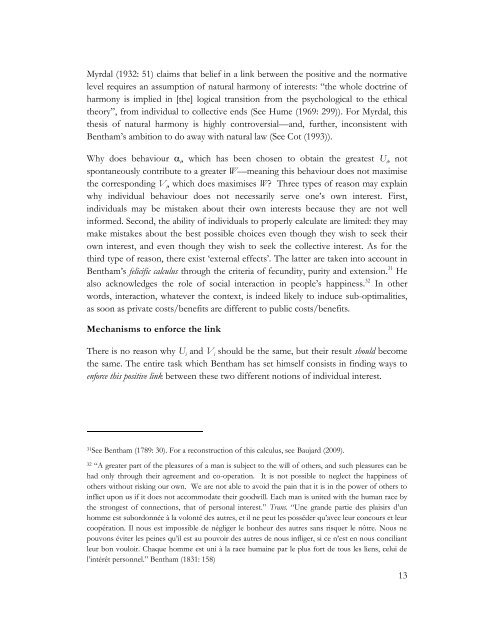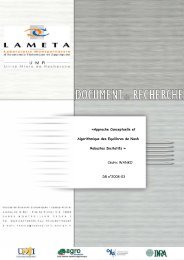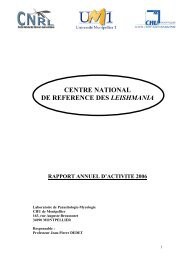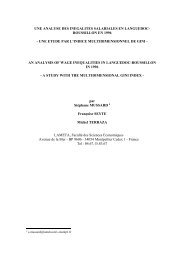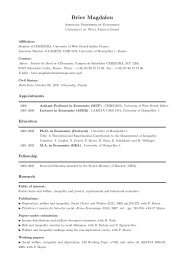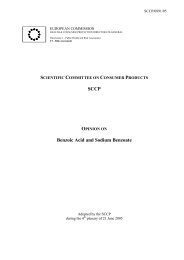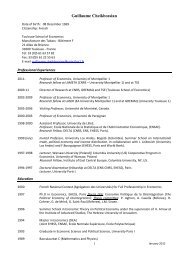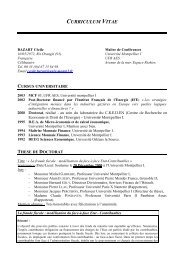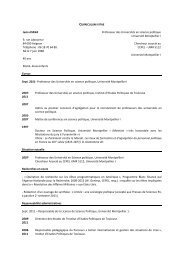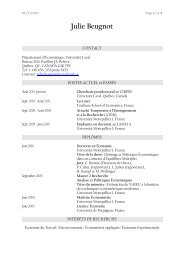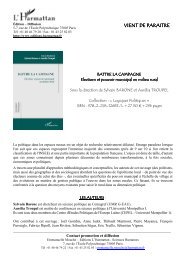COLLECTIVE INTEREST VS - Lameta
COLLECTIVE INTEREST VS - Lameta
COLLECTIVE INTEREST VS - Lameta
You also want an ePaper? Increase the reach of your titles
YUMPU automatically turns print PDFs into web optimized ePapers that Google loves.
Myrdal (1932: 51) claims that belief in a link between the positive and the normativelevel requires an assumption of natural harmony of interests: ―the whole doctrine ofharmony is implied in [the] logical transition from the psychological to the ethicaltheory‖, from individual to collective ends (See Hume (1969: 299)). For Myrdal, thisthesis of natural harmony is highly controversial—and, further, inconsistent withBentham‘s ambition to do away with natural law (See Cot (1993)).Why does behaviour i , which has been chosen to obtain the greatest U i , notspontaneously contribute to a greater W—meaning this behaviour does not maximisethe corresponding V i , which does maximises W? Three types of reason may explainwhy individual behaviour does not necessarily serve one‘s own interest. First,individuals may be mistaken about their own interests because they are not wellinformed. Second, the ability of individuals to properly calculate are limited: they maymake mistakes about the best possible choices even though they wish to seek theirown interest, and even though they wish to seek the collective interest. As for thethird type of reason, there exist ‗external effects‘. The latter are taken into account inBentham‘s felicific calculus through the criteria of fecundity, purity and extension. 31 Healso acknowledges the role of social interaction in people‘s happiness. 32 In otherwords, interaction, whatever the context, is indeed likely to induce sub-optimalities,as soon as private costs/benefits are different to public costs/benefits.Mechanisms to enforce the linkThere is no reason why U i and V i should be the same, but their result should becomethe same. The entire task which Bentham has set himself consists in finding ways toenforce this positive link between these two different notions of individual interest.31 See Bentham (1789: 30). For a reconstruction of this calculus, see Baujard (2009).32 ―A greater part of the pleasures of a man is subject to the will of others, and such pleasures can behad only through their agreement and co-operation. It is not possible to neglect the happiness ofothers without risking our own. We are not able to avoid the pain that it is in the power of others toinflict upon us if it does not accommodate their goodwill. Each man is united with the human race bythe strongest of connections, that of personal interest.‖ Trans. ―Une grande partie des plaisirs d‘unhomme est subordonnée à la volonté des autres, et il ne peut les posséder qu‘avec leur concours et leurcoopération. Il nous est impossible de négliger le bonheur des autres sans risquer le nôtre. Nous nepouvons éviter les peines qu‘il est au pouvoir des autres de nous infliger, si ce n‘est en nous conciliantleur bon vouloir. Chaque homme est uni à la race humaine par le plus fort de tous les liens, celui del‘intérêt personnel.‖ Bentham (1831: 158)13


